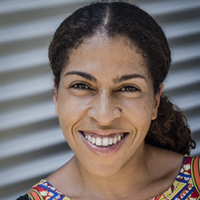Strengthening a Sense of Community Through Arts and Culture

The importance of place and having a sense of community became even more apparent during the shelter-in-place and physical distancing directives, including the inequitable opportunities for minority communities to safely come together during COVID-19.
As communities begin to reopen and move toward post-pandemic recovery efforts, there is an opportunity for greater emphasis on creative placemaking, using art and cultural strategies to improve social and economic conditions. Bringing planners and artists together can help drive economic development, connect or preserve cultural heritage, correct past inequities, and create stronger and healthier communities.
APA's member-led Arts and Planning Interest Group is working to establish a more formal partnership between planners and artists to promote the integration of arts and culture into community development and planning and to broaden opportunities for entry into the profession.
Areas of opportunity include cultural planning, cultural economic development, zoning and permitting for art uses and facilities, and creative placemaking.
The group, which is working toward being recognized as a formal APA Division, sees an opportunity for artists and planners to work together moving forward.
Art and Planning Collaboration Emphasized
Artists can help communicate planning concepts and ideas and offer nontraditional engagement opportunities for the community. Memphis 3.0, the 2020 Daniel Burnham Award for a Comprehensive Plan recipient, engaged artists to help bring the community together around common goals. "Artists have a unique way of engaging communities, getting through the trust barriers that a planning agency or governmental agency may sometimes face," said Ashley Cash of the Office of Comprehensive Planning in Memphis, Tennessee.

Arts and Culture Visiting Fellow Sue Mobley.
To help elevate creative placemaking, the Arts and Planning Interest Group secured a grant from the Kresge Foundation. The grant funding enabled the group to hire Sue Mobley as an Arts and Culture Visiting Fellow. She will work for two years to advance the goals of the interest group and help connect grassroots cultural practitioners and planning professionals.
Mobley is a New Orleans-based urbanist, organizer, and advocate as well as a member of the New Orleans City Planning Commission. She was the director of advocacy at Colloqate Design and co-director of Paper Monuments, a public art and public history project that invited residents to imagine new monuments for New Orleans.
Mobley previously worked as the public programs manager at the Small Center for Collaborative Design at Tulane School of Architecture, combining public pedagogy projects, and strategic collaborations between the academy, public, and nonprofit sectors, adapting social science research methods with architecture students. She is the author of Human Rights, Human Wrongs: Observation of Human Rights Law and Norms in the United Nations Peacekeeping Operations, and a contributor to Remarking New Orleans: Beyond Exceptionalism and Authenticity.
Planning for the Future with Arts
"This is an exciting moment to step into this role," Mobley said. "The intersection of arts and planning offers the potential to dream new and more just systems, better ways of being in community with and caring for each other, and the importance of elevating a multiplicity of perspectives and expressions in creating a better world together."
Arts and culture as essential elements that make places and communities healthy, connected, and vibrant. As communities begin the challenging task of reimaging their future post-pandemic, there is an opportunity to use arts and culture to help build, reestablish, or maintain social cohesion.
Top image: Families participate in a creative placemaking activity that created a neighborhood mural and also focused on maternal and youth health. Photo courtesy The Arts Commission.


